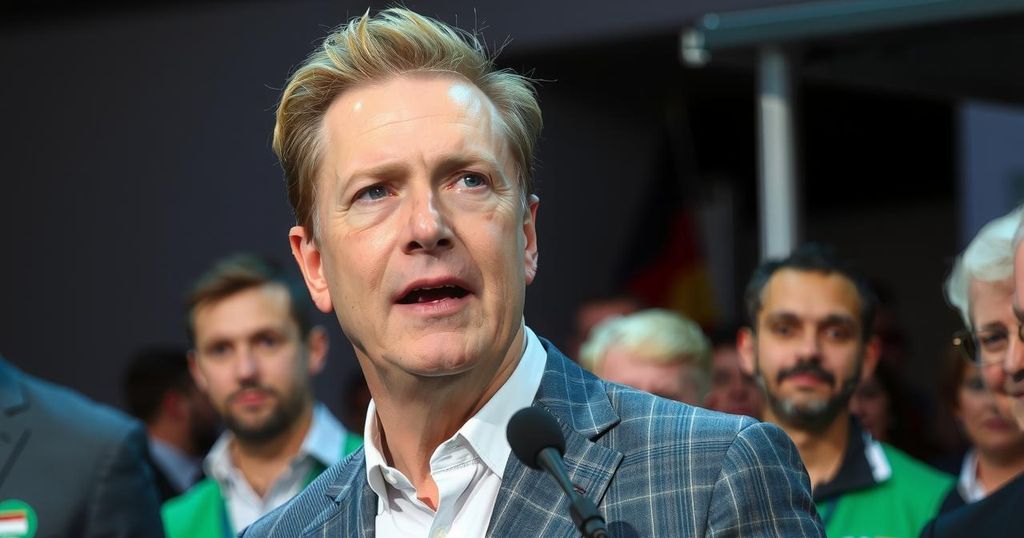Elon Musk Endorses Germany’s Far-Right AfD Party, Sparking Controversy

Tesla CEO Elon Musk has endorsed Germany’s far-right AfD party, claiming it is the only option to save the nation. His comments, made on the platform X, drew criticism from various political figures in Germany, especially amid concerns regarding the party’s historical connections to neo-Nazism. Meanwhile, the AfD has gained traction in upcoming elections, raising discussions on the implications of Musk’s influence in international politics.
Tesla CEO Elon Musk has recently extended his influence towards Germany’s political landscape by expressing support for the far-right Alternative for Germany (AfD) party through a post on X, formerly known as Twitter. In a statement made on Thursday, Musk claimed, “Only the AfD can save Germany,” further fueling the ongoing discussion around his political endorsements. His remarks came alongside the promotion of a post from far-right figure Naomi Seibt, addressing the contentious political climate surrounding Germany’s upcoming elections.
Seibt, noted for her controversial stances including promoting white nationalist ideologies and disputing climate change truths, remarked upon Friedrich Merz, the expected chancellor candidate from the Christian Democratic Union (CDU), suggesting that he is resistant to Musk’s influence. Musk’s endorsement has sparked sharp criticism from various political figures, including Senator Chris Murphy, who described him as “an out of touch billionaire running the incoming Trump Administration” supporting a party with a history linked to neo-Nazism.
The AfD has gained considerable traction within German politics, currently polling second ahead of the February elections. Under Chancellor Olaf Scholz’s leadership, the center-left Social Democrat coalition has faced challenges, deteriorating since November. Scholz quickly refuted Musk’s endorsement by stating that the notion that only a far-right party could “save Germany” is misguided.
Pew Research indicates that the AfD’s stances include opposition to military support for Ukraine and sanctions against Russia, mirroring some of Musk’s prior comments on these issues. While Musk has had a significant hand in financing Trump’s political endeavors, the AfD has also criticized Tesla, highlighting the economic implications of the factory on local employment in Brandenburg.
Electoral prospects aside, Musk’s backing is part of a broader trend of far-right political support across Europe, where similar parties have registered increasing popularity, paralleling movements in Italy and the U.K. This period has proved challenging for Tesla in Europe, with sales of their vehicles experiencing a significant downturn, despite past successes attributed to Musk’s visibility and ventures that align with the populist sentiments of these parties.
The Alternative for Germany (AfD) party represents a significant shift in Germany’s political spectrum, adopting far-right, nationalist positions. This party has been controversial due to its historical connections and ideological parallels to past fascist movements. Elon Musk, a prominent figure with extensive influence through his social media platforms, has previously aligned himself with other right-leaning politicians globally, raising questions about the intersection of business, politics, and ideology. The endorsement of the AfD by such a high-profile individual signifies a potentially transformative moment in Germany’s political fabric, particularly with upcoming elections where the party has gained popularity despite being shunned by others for coalition talks. Musk’s remarks amplify the visibility of these relationships and political ideologies, inviting scrutiny at a critical time for European politics.
In conclusion, Elon Musk’s endorsement of the Alternative for Germany party has stirred considerable debate and criticism within the political arena. His remarks, shared on a major social media platform, signal an active engagement in international politics that could have ramifications for both Germany and wider European dynamics. The AfD’s presence in German politics amidst electoral challenges highlights broader trends of far-right movements gaining traction across the continent, underscoring the importance of understanding these developments within global political contexts.
Original Source: www.cnbc.com







